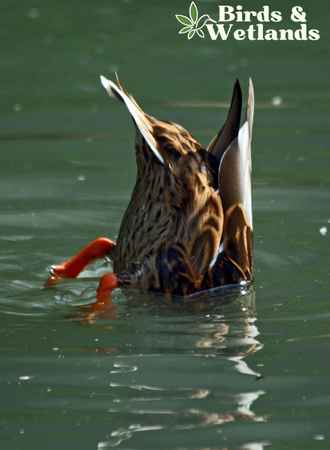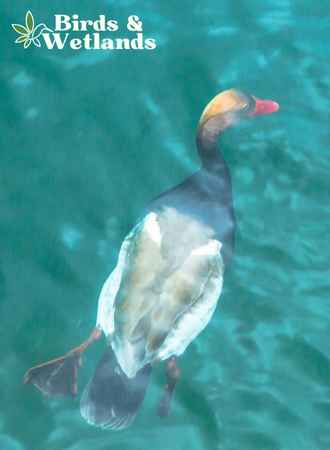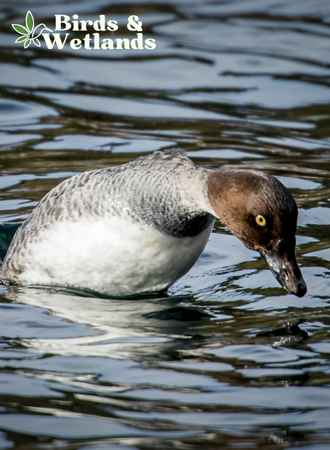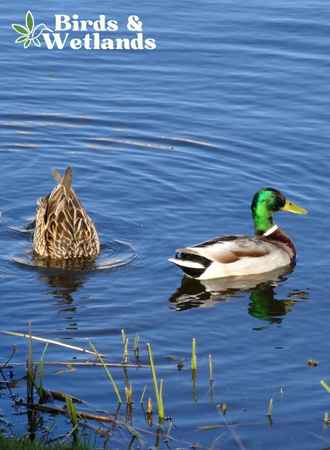Ducks are reputed for their excellent swimming and water navigation skills. But how long can they remain submerged? Let’s investigate it further!
Ducks, specifically diving ducks, can stay underwater for about 30 seconds to 1 minute on average during a single dive. However, some species are capable of staying submerged for longer periods, with records of up to 3-4 minutes in certain situations. Their ability to stay underwater is essential for foraging, as many duck species dive to find food.
Key Takeaways on How Long Can Ducks Remain Underwater
- Not all ducks can dive underwater. Dabbling ducks stay on the surface of the water while putting their heads underwater. On the other hand, diving ducks dive underwater. Ducks are highly specialized waterfowl, with some breeds designed for underwater diving.
- Ducks can stay underwater for up to a minute on average, with the time varying based on the breed and its specific characteristics.
- Ducks are categorized into two groups: Divers and Dabblers. Dabblers are lighter and stick to shallow water, while Divers are heavier, more compact, and capable of feeding as deep as 65 feet.
- Ducks can hold their breath for 10-30 seconds typically, but Divers can do so for up to a minute, allowing them to descend, forage, feed, and return to the surface for air.
- Ducks have webbed feet and waterproof feathers, which help them push farther and tolerate colder water. Their feathers get their waterproof quality from oil produced by a preen gland near their tail.
- Diver ducks are especially designed for diving with wider bodies, compact wings, and larger webbed feet. They can expel air to reduce buoyancy before a dive.
- Underwater, diving ducks reduce their oxygen intake and their heart rate slows down, conserving energy and oxygen.
- Ducks cannot breathe underwater. They hold large amounts of air and distribute the oxygen efficiently and slowly, allowing them to be underwater for up to a minute.
- Ducks can drown, particularly ducklings, which haven’t developed their preen gland for waterproofing. Female ducks can also drown during mating.
- Diver ducks are built to swim underwater, using their feet like paddles and their bodies and heads for navigation.
- On average, ducks can stay underwater for up to 10-60 seconds.
- Ducks can dive under the water because of their well-adjusted oxygen consumption, oxygen-storing air sacs, and high cold resistance.
Why Do Ducks Go Underwater?

Adult ducks are known for their ability to float and swim. But certain species of ducks are also capable of diving underwater. These ducks are called diving ducks.
Diving ducks usually spend their time in the sea, wading through the water or flying over it. However, most of what they eat can be found underwater rather than on land or in shallow water.
Diving ducks mostly eat aquatic plants such as algae and seaweed. They also eat mollusks, small fish, crustaceans, insects and tiny invertebrates. All of these food sources are found underwater.
How Long Can a Duck Stay Underwater?
Most ducks can dive underwater at varying levels. Some duck species are much better at diving than others.
Diving ducks and sea ducks such as the long-tailed duck are physically built for greater diving efficiency. Scoters, mergansers and eiders are all diving ducks that dive underwater to forage for food. How long each of these ducks stays underwater varies from one another.
For instance, red-breasted merganser has been observed to stay underwater for 44 seconds, while eiders and scoters have for 60 seconds. White-winged scoter spent 58 seconds underwater. These ducks may occasionally take shorter dives, lasting for a few seconds. A typical dive can take between 20 to 60 seconds. There may not be any duck breed that can hold their breath for more than 60 seconds, not even diver ducks.
Although dabbling ducks don’t dive, they dunk their heads into the water to look for food. They can submerge their heads underwater for 10 to 20 seconds.
Which Ducks Can Swim Underwater?
There are three types of ducks; dabbling, diving and perching. Not all ducks swim underwater, only diving ducks can submerge their entire bodies and remain underwater for up to 60 seconds.
Dabbling ducks are a type of waterfowl that can be identified by their short, stocky build and distinctive foraging behavior. Unlike a diving duck, which hunts for prey by diving into the water, dabbling ducks spend most of their time skimming the surface with their long bills.
This foraging technique gives them a distinct “dabbling” appearance as they quickly dip their heads and necks into the water before jumping back up to swallow whatever bugs or small fish they have caught.
Diving ducks are waterfowl distinguished by their ability to dive into the water in search of food. Unlike other ducks and most birds, which spend most of their time on the surface, diving ducks are excellent swimmers who spend most of their time underwater.
They have specially adapted bills that allow them to locate prey such as clams, mussels, and aquatic insects quickly. They have powerful legs that enable them to move easily through the water.
How Deep Can a Duck Dive?

Diving ducks are well-known for their ability to dive beneath the water’s surface in search of food. While most species prefer a diving depth of 6 to 10 feet, some exceptions exist.
For example, long-tailed ducks and mergansers have been observed diving as deep as 40ft (12m), while the Common eider can dive even deeper, reaching depths of 60 to 65ft (20 to 25m).
Why Can Ducks Stay Underwater for So Long?
Ducks are notable for their ability to remain submerged in water for extended periods. How long can ducks hold their breathe underwater depends on the breed of the duck. An average duck can hold its breath for 25 seconds. Several factors contribute to this exceptional ability, including their buoyant feathers and strong webbed feet.
Diving ducks have shorter, more compact wings than other birds so that they can propel themselves underwater with great force.
What truly distinguishes diving ducks is their extraordinary ability to tolerate low oxygen levels and asphyxia. Their circulatory systems maintain adequate respiration levels even in extreme conditions. These natural adaptations combine to make ducks some of the best divers in the animal kingdom.
FAQs on How Long Can a Duck Stay Underwater
Why Do Ducks Put Their Head Underwater?
Ducks are charming birds known for many unusual behaviors, one of which is their penchant for tipping their heads underwater. This seemingly odd duck behavior is actually normal among waterfowl, particularly ducks.
Most ducks live near or on wetlands, where water levels vary greatly over time and from one season to another. To survive, ducks must seek out food sources they can reach, whether perched on the surface or submerged in deeper waters.
Ducks can easily reach aquatic vegetation and invertebrates hiding just below the water’s surface by feeding upside down. Tipping their heads under allows ducks to search for food items that would otherwise escape their notice when they are head-up.
Can Ducks Drown?

Although ducks are not true aquatic birds, they are quite adept at maneuvering in and out of the water and can hold their breath for surprisingly long periods.
Ducks can go for up to a minute underwater without breathing. Their ability to stay underwater for this duration is possible because ducks use their final breath before submerging to consume oxygen efficiently.
While ducks and other waterfowl can stay underwater for extended periods, they can drown if they remain submerged for too long. Ducks must continually rise to the surface to breathe, and if they cannot do so, they will develop stroke-like symptoms and may even lose consciousness.
Can Ducks Breathe Underwater?
You’ve seen ducks dive under the water, but can ducks breath underwater? The answer is, they can’t.
Ducks cannot breathe underwater because they lack gills. In fact, no avian species can breathe underwater, not even penguins. However, some ducks can stay underwater for up to 60 seconds without breathing. Diving ducks hold their breath and use the oxygen they draw from the air before diving, just as humans do when they hold their breath for too long.
Can a Duck Drown Another Duck?

Due to their aggressive mating behavior, one duck can drown another accidentally. Male ducks become extremely aggressive during breeding, pursuing and forcing females to mate. Multiple males ganging up on a lone female often leads to accidental drowning. This seemingly brutal mating behavior is a relatively uncommon occurrence, but it can be devastating for female ducks who have not yet established their position in the flock. Most ducks can avoid this deadly peril by swimming in large groups until the end of the breeding season.
Can Ducklings Go Underwater?
When can ducklings swim depends on the species but generally two to four weeks after hatching, ducklings are already confident swimmers. These young ducks are born able to bob along in the water, but they are not truly proficient swimmers until two to four weeks after hatching.
During this time, they are observed diving and catching insects, sometimes even at greater depths. Although their dives are relatively brief by adult standards, these small birds appear perfectly capable of navigating their aquatic environment with dexterity and grace.
Do Ducklings Drown?
Due to the absence of gills, ducklings or baby ducks must rely on their lungs to take oxygen from the surrounding air. Duckling muscles are still weak and developing. As a result, they cannot maintain complete submersion of their heads for an extended period. They will drown if they remain submerged for too long because they cannot inhale enough oxygen from the water.
The inability to breathe underwater makes them especially vulnerable in areas with swift-moving water or strong currents. It can be difficult for even fully grown ducks to keep their heads above water for an extended time. Ducklings may also inhale water accidentally which is extremely dangerous for them.

